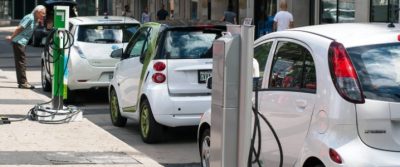$35 Billion: UK Faces Huge Loss from Electric Vehicle Adoption

If Great Britain keeps its commitment to switch over its vehicles to electric by 2050, the government will see a whopping loss of 28 billion pounds ($35 billion) paid by motorists driving traditional gasoline- and diesel-powered vehicles.
That comes from a study released Friday by London-based Institute for Fiscal Studies examining the impact of the UK’s net-zero greenhouse gas emissions law adopted in June and signed by previous Prime Minister Theresa May. England became the first G7 country to set the goal of reaching zero net emissions by 2050.
Fuel duties on petrol-powered vehicles make up almost 4 percent of total government receipts — and all of that will disappear unless urgent action is taken, according to think tank IFS’ study. The government may need to take a new approach to taxing motorists as all-electric and plug-in hybrid vehicles become the norm, the study advises.
The UK’s mission to switch over to EVs and renewable energy by 2050 represents “a huge long-run fiscal challenge” for the government, according to the study.
The government faces other hits on tax revenue. The UK will be seeing a drop of about 20 billion pounds a year ($24.5 billion) from the government’s new policy of freezing tax duties to help people struggling with the cost of living, the IFS said. There’s also concern that another 1 billion pounds ($1.229 billion) could be lost if Prime Minister Boris Johnson follows through on his commitment to cut duties by 2 pence per liter of fuel.
“The government should set out its long-term plan for taxing driving, before it finds itself with virtually no revenues from driving and no way to correct for the costs -– most importantly congestion –- that driving imposes on others,” said Rebekah Stroud, an IFS economist who co-authored the report.
Duty on unleaded gasoline and diesel has remained frozen at 57.95 pence per liter since 2011, accounting for 1.3 percent of England’s GDP. The fuel recently has been costing 126.9 pence per liter, of which 57.95 pence is duty — about 45 percent of the total fuel cost.
The think tank recommends implementing taxes on EVs soon, as car owners are becoming used to avoiding these duties on their fuel. New motoring taxes should reflect distance driven and vary according to when and where the trips take place in the vehicle. A flat-rate tax per mile driven could be another taxation model used, according to the study.
Prime Minister Johnson used his platform at the Conservative Party conference last week to advocate for continuing support in the net-zero emissions mandate by mid-century. Johnson has a strategy to be put into place advocating investments made in EV production, energy reduction in all new homes, and the planting of one million trees to combat climate change.
The Tory party has a much larger policy question to address first — what to do about Brexit. The UK is due to leave the European Union at the end of this month.
The new prime minister isn’t interested in hearing arguments made by protesters warning of imminent disaster from climate change. Thousands of climate change protestors blocked London’s roads and bridges on Oct. 8 to launch a two-week long demonstration. That led to the Metro police arresting 280 activists.
Johnson was perturbed to see tents pitched just yards away from the front door at No. 10. He labelled them “uncooperative crusties and protesters.”
He had more to say about them, branding them “importunate nose-ringed climate change protesters.”
Electric vehicle sales have been gaining traction in England, with September sales reaching 12,883 — which is 97.7 percent more than a year ago and the best month ever on record. Battery electric vehicles are seeing more of the gain — at 25,097 this year, up 122 percent year-over-year. At 22,773 units sold this year, plug-in hybrids were down 29.2 percent year-over-year.
The Tesla Model 3 has been shining in the UK market, with over 2,000 deliveries in August. It was the top-selling model of any kind in London for the second month in a row as of the end of September.
*
Note to readers: please click the share buttons above or below. Forward this article to your email lists. Crosspost on your blog site, internet forums. etc.
Jon LeSage is a California-based journalist covering clean vehicles, alternative energy, and economic and regulatory trends shaping the automotive, transportation, and mobility sectors.

